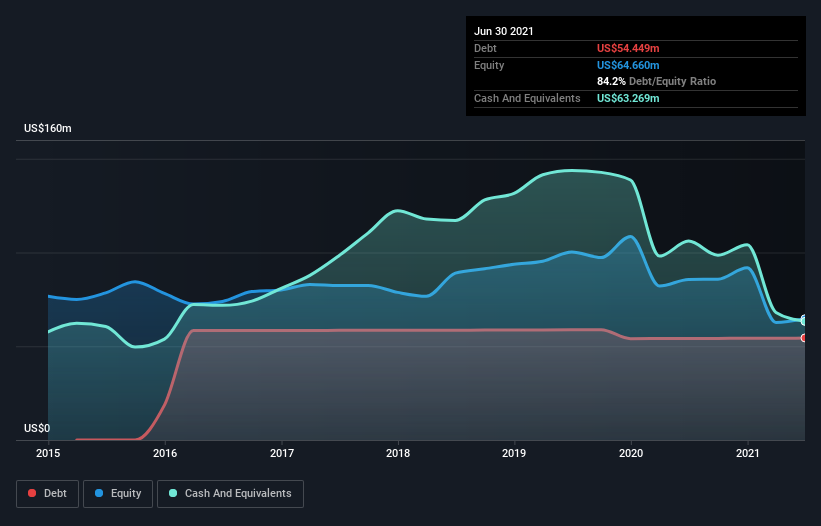We Think Orca Energy Group (CVE:ORC.B) Is Taking Some Risk With Its Debt
The external fund manager backed by Berkshire Hathaway's Charlie Munger, Li Lu, makes no bones about it when he says 'The biggest investment risk is not the volatility of prices, but whether you will suffer a permanent loss of capital.' So it seems the smart money knows that debt - which is usually involved in bankruptcies - is a very important factor, when you assess how risky a company is. As with many other companies Orca Energy Group Inc. (CVE:ORC.B) makes use of debt. But should shareholders be worried about its use of debt?
Why Does Debt Bring Risk?
Generally speaking, debt only becomes a real problem when a company can't easily pay it off, either by raising capital or with its own cash flow. Part and parcel of capitalism is the process of 'creative destruction' where failed businesses are mercilessly liquidated by their bankers. However, a more common (but still painful) scenario is that it has to raise new equity capital at a low price, thus permanently diluting shareholders. Having said that, the most common situation is where a company manages its debt reasonably well - and to its own advantage. When we examine debt levels, we first consider both cash and debt levels, together.
Check out our latest analysis for Orca Energy Group
What Is Orca Energy Group's Debt?
As you can see below, Orca Energy Group had US$54.4m of debt, at June 2021, which is about the same as the year before. You can click the chart for greater detail. However, its balance sheet shows it holds US$63.3m in cash, so it actually has US$8.82m net cash.
How Strong Is Orca Energy Group's Balance Sheet?
According to the last reported balance sheet, Orca Energy Group had liabilities of US$44.8m due within 12 months, and liabilities of US$93.8m due beyond 12 months. Offsetting these obligations, it had cash of US$63.3m as well as receivables valued at US$20.4m due within 12 months. So its liabilities total US$54.9m more than the combination of its cash and short-term receivables.
Orca Energy Group has a market capitalization of US$153.6m, so it could very likely raise cash to ameliorate its balance sheet, if the need arose. However, it is still worthwhile taking a close look at its ability to pay off debt. While it does have liabilities worth noting, Orca Energy Group also has more cash than debt, so we're pretty confident it can manage its debt safely.
It is just as well that Orca Energy Group's load is not too heavy, because its EBIT was down 25% over the last year. When it comes to paying off debt, falling earnings are no more useful than sugary sodas are for your health. The balance sheet is clearly the area to focus on when you are analysing debt. But it is future earnings, more than anything, that will determine Orca Energy Group's ability to maintain a healthy balance sheet going forward. So if you're focused on the future you can check out this free report showing analyst profit forecasts.
Finally, a business needs free cash flow to pay off debt; accounting profits just don't cut it. Orca Energy Group may have net cash on the balance sheet, but it is still interesting to look at how well the business converts its earnings before interest and tax (EBIT) to free cash flow, because that will influence both its need for, and its capacity to manage debt. In the last three years, Orca Energy Group's free cash flow amounted to 42% of its EBIT, less than we'd expect. That weak cash conversion makes it more difficult to handle indebtedness.
Summing up
Although Orca Energy Group's balance sheet isn't particularly strong, due to the total liabilities, it is clearly positive to see that it has net cash of US$8.82m. So although we see some areas for improvement, we're not too worried about Orca Energy Group's balance sheet. The balance sheet is clearly the area to focus on when you are analysing debt. However, not all investment risk resides within the balance sheet - far from it. For example Orca Energy Group has 4 warning signs (and 1 which can't be ignored) we think you should know about.
At the end of the day, it's often better to focus on companies that are free from net debt. You can access our special list of such companies (all with a track record of profit growth). It's free.
This article by Simply Wall St is general in nature. We provide commentary based on historical data and analyst forecasts only using an unbiased methodology and our articles are not intended to be financial advice. It does not constitute a recommendation to buy or sell any stock, and does not take account of your objectives, or your financial situation. We aim to bring you long-term focused analysis driven by fundamental data. Note that our analysis may not factor in the latest price-sensitive company announcements or qualitative material. Simply Wall St has no position in any stocks mentioned.
Have feedback on this article? Concerned about the content? Get in touch with us directly. Alternatively, email editorial-team (at) simplywallst.com.

 Yahoo Finance
Yahoo Finance 
